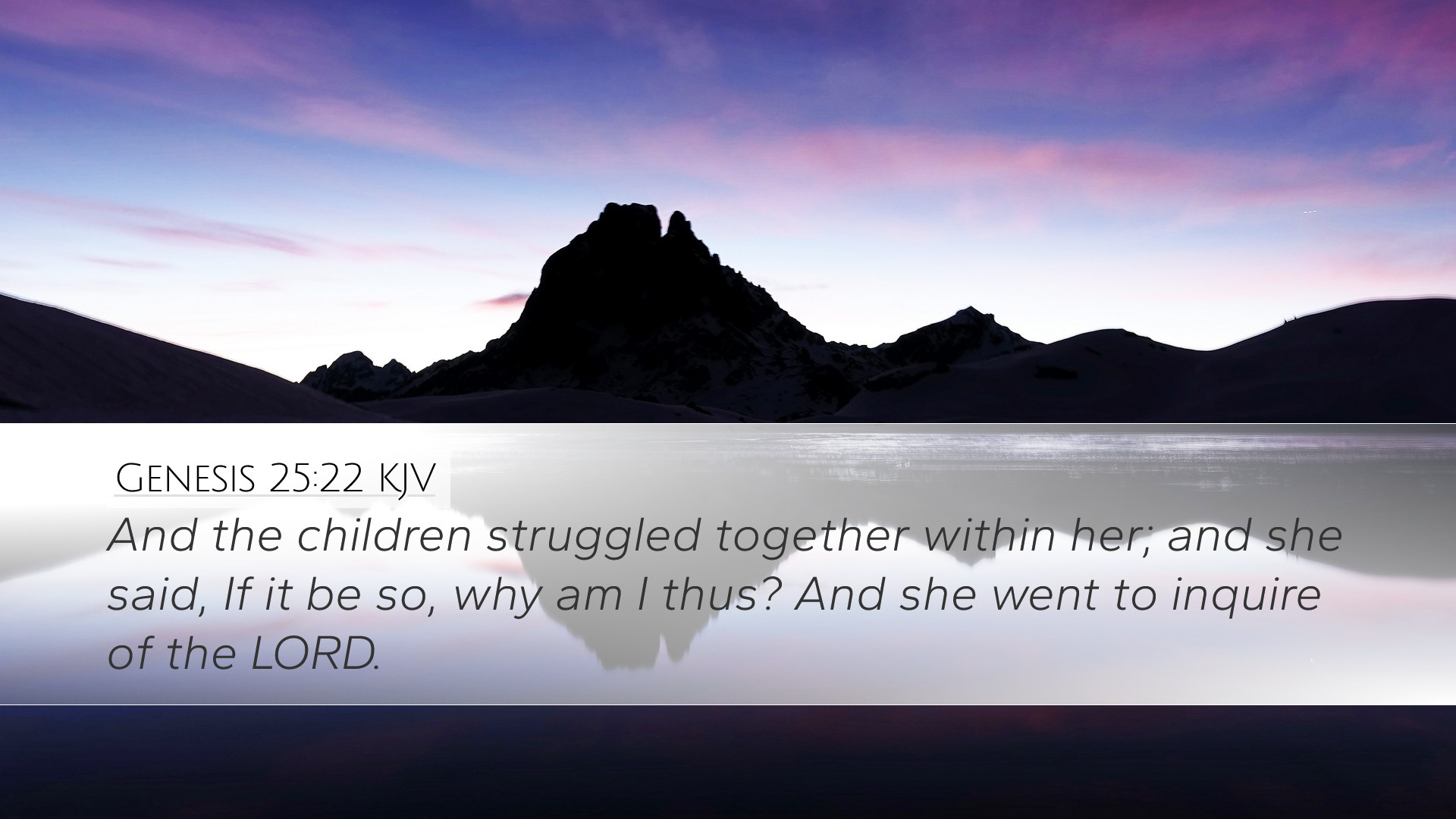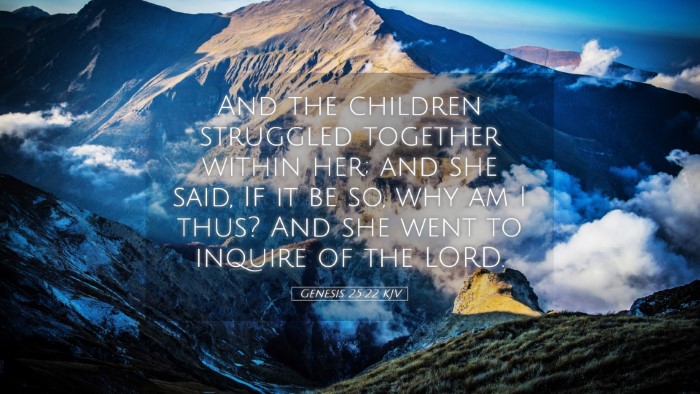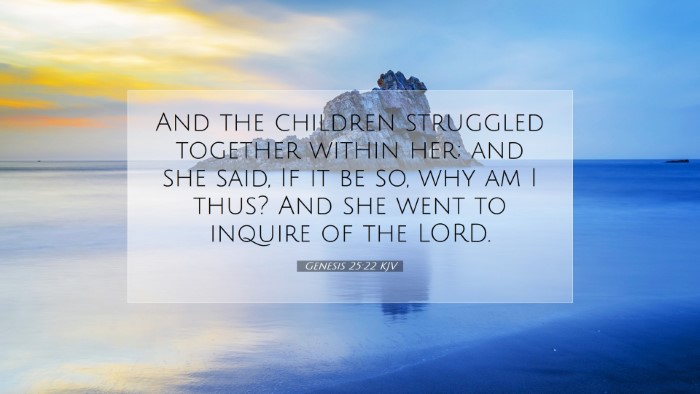Commentary on Genesis 25:22
Verse: "But the children struggled together within her; and she said, If it be so, why am I thus? And she went to inquire of the Lord."
Introduction
This verse from Genesis relates to the pregnancy of Rebekah, the wife of Isaac, who experiences a tumultuous struggle within her womb as she carries twin sons. The struggle signifies not only the physical discomfort but also the prophetic insight into the future of her children, Esau and Jacob, which is further revealed in subsequent verses. This commentary seeks to explore the significance of this struggle, the implications of Rebekah's inquiry to the Lord, and the theological insights that arise from this narrative.
Contextual Background
The narrative of Genesis 25 unfolds in the broader context of the Abrahamic covenant. Following the life of Abraham and the covenant promises made to him, the story transitions to Isaac and Rebekah. Rebekah’s barrenness and her eventual pregnancy after Isaac’s intercession is central to the lineage of the chosen people of God. The twins' birth, and the struggle within Rebekah, foreshadows the complex relationship that will develop between them, representative of larger themes in biblical theology.
Insights from Commentaries
Matthew Henry's Perspective
Matthew Henry highlights the intense struggle within Rebekah as indicative of the conflict that will arise between her sons. He notes that “the children struggled together” is a demonstration of the future enmity between Jacob and Esau, reflecting the larger tensions that exist within humanity at large. Henry interprets Rebekah’s anguish as a moment of divine revelation, leading her to seek counsel from the Lord, illustrating the necessity of turning to God in times of distress.
Albert Barnes' Analysis
Albert Barnes offers a theological reflection on the nature of the struggle. He suggests that it serves as a premonition of the distinct paths that the two sons would take, representing two nations. Barnes emphasizes that God intended for Rebekah to know of the significant differences between her sons, thereby indicating that the elder would serve the younger, a theme deeply rooted in biblical tradition. Barnes stresses that God's sovereignty is at work even in the womb, preparing the narrative of redemption in His divine plan.
Adam Clarke's Commentary
Adam Clarke provides an interesting interpretation of the physical struggle, suggesting it symbolizes the spiritual conflict inherent in human nature. He posits that Rebekah’s question, “If it be so, why am I thus?” reflects not just her physical discomfort, but also a deeper existential inquiry about her purpose and the implications of carrying these two boys. Clarke suggests that her inquiry to God is a model for believers on how to seek divine understanding amidst life's turmoil.
Rebekah's Inquiry
The act of Rebekah going to “inquire of the Lord” is a pivotal moment in the verse. In times of uncertainty, her response exemplifies an important principle in the life of faith: the necessity of seeking divine guidance. Rebekah’s questions are met with revelation, showcasing a relational aspect of God who desires to communicate with those who seek Him earnestly.
Theological Implications
This passage raises profound theological implications regarding God’s sovereignty, human agency, and the unfolding of divine purposes. The struggle embodies the tension that exists in human relationships and the messiness of life which often leads to questions of purpose and direction. It serves as a reminder that even in the chaos of life, God is at work fulfilling His promises, guiding and directing His people.
Application for Pastors and Theologians
- Understanding Struggles: Pastors can use this narrative to speak to the realities of inner conflict that individuals experience, encouraging them to seek God in their struggles.
- Highlighting Divine Sovereignty: The sovereignty of God, illustrated by the unfolding events in Rebekah's life, can be a powerful teaching point in sermons on God's providence.
- Encouraging Inquiry: This passage invites believers to bring their questions and struggles before God, fostering a culture of prayer and dependence on divine wisdom.
- Preaching on Conflict: The dynamic between Jacob and Esau offers a lens through which to address themes of conflict, reconciliation, and God's ability to use difficult circumstances for His glory.
Conclusion
Genesis 25:22 is a rich text that speaks to the complexities of family dynamics, the struggles within individuals, and the overarching narrative of God's redemptive plan. As Rebekah navigates her tumultuous pregnancy, her response serves as a model for believers facing their own struggles. By turning to the Lord for guidance, she sets a precedent for those who seek to understand their circumstances through the lens of divine purpose. The insights derived from public domain commentaries enrich our understanding, making this passage meaningful for pastors, students, theologians, and all who desire to delve deeper into the Word of God.


